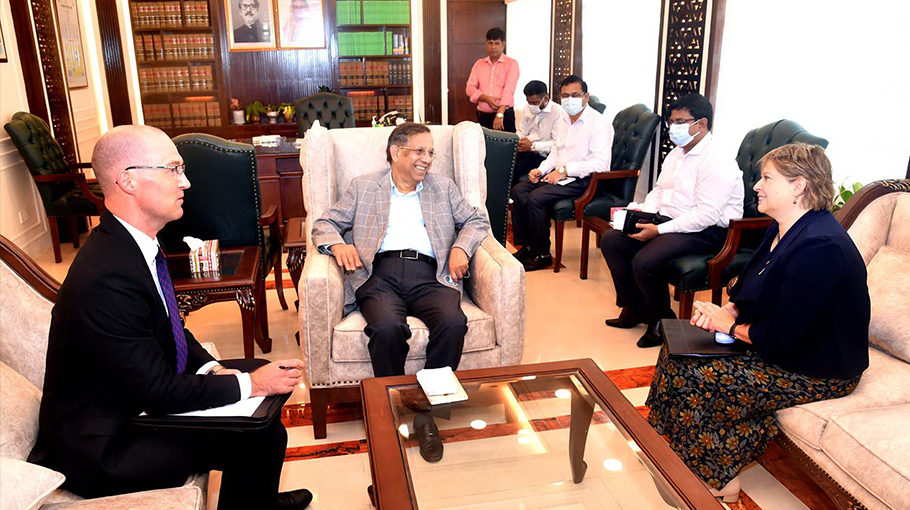Find alternative way to send back Bangabandhu’s killer Noor
Dhaka asks Canada


Law, Justice and Parliamentary Affairs Minister Anisul Huq on Tuesday requested the Canadian government to find an "alternative way" to send back Father of the Nation Bangabandhu Sheikh Mujibur Rahman's convicted killer Noor Chowdhury.
He made the request when Canadian High Commissioner Lilly Nicholls called on him at his secretariat office. "We have discussed ways to send back Noor Chowdhury from Canada,” he said after the meeting.
“The High Commissioner informed us that Canadian law does not permit sending such persons to those countries where execution of death sentences takes place. I requested her to look into the possibilities of finding an alternative way to send him back. Sheltering a convicted killer is a violation of human rights," said the law minister.
“They discussed 50 years of friendship between the two nations, as well as areas of mutual cooperation, including the importance of freedom of expression and the media in democratic societies,” the Canadian High Commission said in a statement.
Canada established diplomatic relations with Bangladesh in 1972. The year 2022 marks the 50 years of the bilateral relation which is focused on development cooperation, trade and investment and people-to-people links.
“People-to-people links between Canada and Bangladesh are expanding. The Bangladeshi-Canadian community is estimated at over 100,000 and continues to make significant contributions to Canadian prosperity and to the multi-cultural fabric of Canada,” according to the Canadian government.
Through bilateral engagement, Canada regularly encourages Bangladeshi authorities to ensure that human rights and democratic freedoms are respected.
“Canada works with the Government of Bangladesh to ensure that the needs of the Rohingya refugees it hosts are met, as well as those of impacted Bangladeshi communities.”
In 2017, attacks against the Rohingya minority in Rakhine State in Myanmar caused over 770,000 Rohingya to flee to Bangladesh’s Cox’s Bazar district, where nearly one million still live.
The horrors inflicted on Rohingya women, children and men during the August 2017 operations included mass killings, torture, the burning of hundreds of village, as well as widespread and systematic rape and other forms of sexual violence.
Canada has provided over $4 billion of international assistance to Bangladesh since 1972.
Current programming supports mutual priorities in the areas of gender equality and empowerment of women and girls, health, including sexual and reproductive health and rights, skills training and support to the ready-made garment sector.
These development priorities are in line with Canada’s Feminist International Assistance Policy.
Canada’s commercial relationship with Bangladesh has grown significantly over the last 14 years. The value of bilateral merchandise trade has more than tripled from $600.5 million in 2004 to over $2.4 billion Canadian dollars in 2018.
During this period, Canadian merchandise exports to Bangladesh have increased over six fold. Canadian merchandise exports to Bangladesh were $651 million in 2018, of which 70% were agriculture items.
Canadian merchandise imports from Bangladesh were nearly $1.7 billion in 2018. Canada’s popularity is increasing as a “study destination of choice” for Bangladeshi students.
The number of Bangladeshi students who choose to study in Canada in 2018 is more than 6,500, an increase of more than 150% from 2014.
Canada’s main exports to Bangladesh include: cereals, pulses, iron and steel, fertilizer (potash), chemicals, aircraft, related equipment and services.
Bangladesh is Canada’s fourth largest pulse export market (e.g. dry peas, lentils, chickpeas), and a major market for high quality wheat.
In addition, several flagship Canadian companies from the readymade garments, aerospace, defence and security sectors are active in the Bangladesh market and pursuing new business opportunities.
Canada has supplied Bangladesh more than one million tons of potash since 1972.
In partnership with the Canadian Commercial Corporation, the Government of Canada signed the first government-to-government agreement with the Government of Bangladesh in April 2014 to export high quality potash fertilizer to Bangladesh.
In August 2013, Canada and Bangladesh concluded negotiations of a first-time bilateral air transport agreement in Ottawa. Both countries agreed to apply the agreement on an administrative basis immediately.
Canada’s main merchandise imports from Bangladesh included: woven apparel, knit apparel, miscellaneous textile articles, headgear and footwear.
Garments and textile products make up the bulk of Canada’s merchandise imports from Bangladesh. Bangladesh has enjoyed duty-free market access to Canada, for most goods, since 2003.
Potential trading opportunities for Bangladesh to explore include: expanding Canadian imports of ready-made garments, porcelain, leather goods, jute and quality jute goods, ceramic, tableware and kitchenware, and frozen fish, among others.



